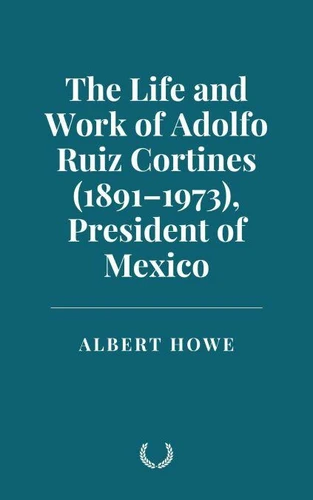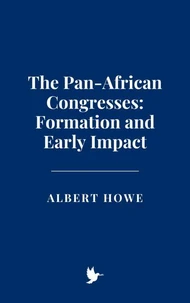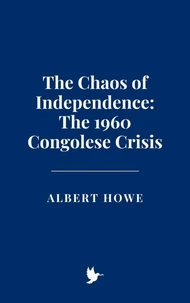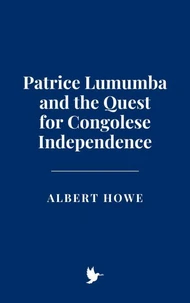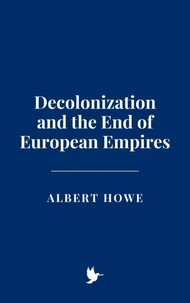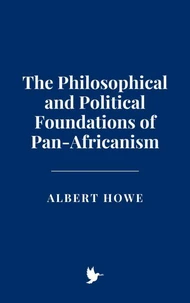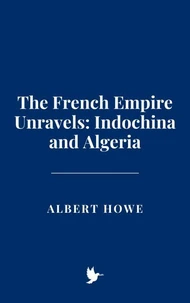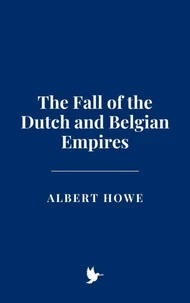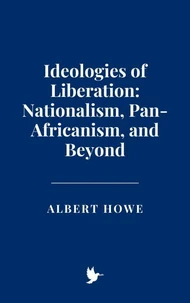The Life and Work of Adolfo Ruiz Cortines (1891–1973) President of Mexico
Par :Formats :
Disponible dans votre compte client Decitre ou Furet du Nord dès validation de votre commande. Le format ePub est :
- Compatible avec une lecture sur My Vivlio (smartphone, tablette, ordinateur)
- Compatible avec une lecture sur liseuses Vivlio
- Pour les liseuses autres que Vivlio, vous devez utiliser le logiciel Adobe Digital Edition. Non compatible avec la lecture sur les liseuses Kindle, Remarkable et Sony
 , qui est-ce ?
, qui est-ce ?Notre partenaire de plateforme de lecture numérique où vous retrouverez l'ensemble de vos ebooks gratuitement
Pour en savoir plus sur nos ebooks, consultez notre aide en ligne ici
- FormatePub
- ISBN8230795322
- EAN9798230795322
- Date de parution19/01/2025
- Protection num.pas de protection
- Infos supplémentairesepub
- ÉditeurIndependently Published
Résumé
Adolfo Ruiz Cortines served as the President of Mexico from 1952 to 1958, a period marked by significant political and social challenges as the country navigated its post-revolutionary transformation. His presidency, defined by gradual reforms, fiscal austerity, and a commitment to social justice, stands as a model of ethical leadership. Ruiz Cortines' approach to governance emphasized the balance between maintaining political stability and addressing the needs of marginalized sectors, particularly rural populations.
His legacy includes the expansion of social security, rural education, and health care, as well as his efforts to fight corruption within the PRI. He was deeply influenced by the revolutionary ideals of José Vasconcelos and other intellectuals, integrating these into his policies to promote national unity and equity. Despite facing challenges such as economic inequality, political discontent, and external pressures from the Cold War, Ruiz Cortines' leadership remains a significant chapter in Mexican history.
His focus on gradual reform, institutional integrity, and social welfare continues to serve as a valuable lesson for future political leaders in navigating the complexities of modernization while adhering to ethical governance.
His legacy includes the expansion of social security, rural education, and health care, as well as his efforts to fight corruption within the PRI. He was deeply influenced by the revolutionary ideals of José Vasconcelos and other intellectuals, integrating these into his policies to promote national unity and equity. Despite facing challenges such as economic inequality, political discontent, and external pressures from the Cold War, Ruiz Cortines' leadership remains a significant chapter in Mexican history.
His focus on gradual reform, institutional integrity, and social welfare continues to serve as a valuable lesson for future political leaders in navigating the complexities of modernization while adhering to ethical governance.
Adolfo Ruiz Cortines served as the President of Mexico from 1952 to 1958, a period marked by significant political and social challenges as the country navigated its post-revolutionary transformation. His presidency, defined by gradual reforms, fiscal austerity, and a commitment to social justice, stands as a model of ethical leadership. Ruiz Cortines' approach to governance emphasized the balance between maintaining political stability and addressing the needs of marginalized sectors, particularly rural populations.
His legacy includes the expansion of social security, rural education, and health care, as well as his efforts to fight corruption within the PRI. He was deeply influenced by the revolutionary ideals of José Vasconcelos and other intellectuals, integrating these into his policies to promote national unity and equity. Despite facing challenges such as economic inequality, political discontent, and external pressures from the Cold War, Ruiz Cortines' leadership remains a significant chapter in Mexican history.
His focus on gradual reform, institutional integrity, and social welfare continues to serve as a valuable lesson for future political leaders in navigating the complexities of modernization while adhering to ethical governance.
His legacy includes the expansion of social security, rural education, and health care, as well as his efforts to fight corruption within the PRI. He was deeply influenced by the revolutionary ideals of José Vasconcelos and other intellectuals, integrating these into his policies to promote national unity and equity. Despite facing challenges such as economic inequality, political discontent, and external pressures from the Cold War, Ruiz Cortines' leadership remains a significant chapter in Mexican history.
His focus on gradual reform, institutional integrity, and social welfare continues to serve as a valuable lesson for future political leaders in navigating the complexities of modernization while adhering to ethical governance.

